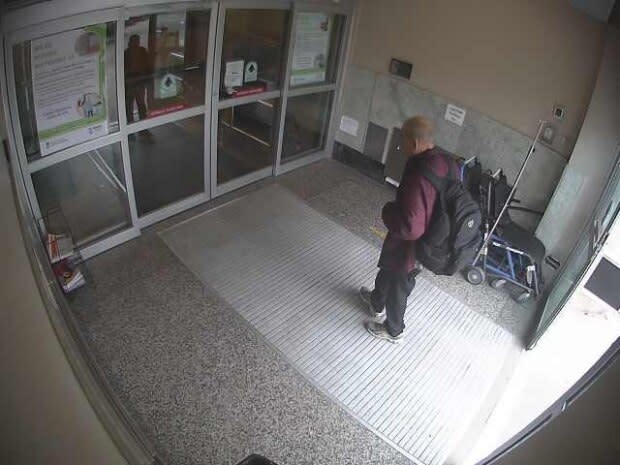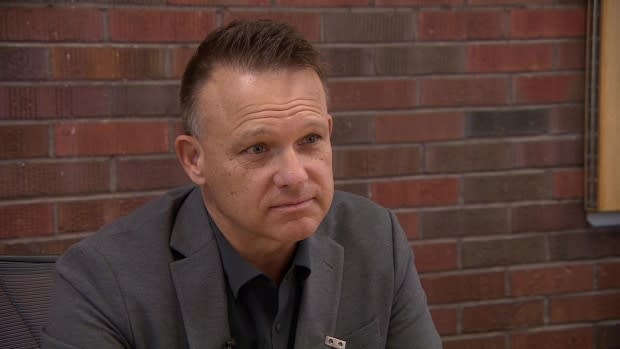'We need answers,' family of Allan Landrie says a year after his body was found in Saskatoon hospital
The last year has been a turbulent one for family members of Allan Landrie as they've experienced fear, sadness and frustration. The family gathered to honour his life this weekend, but they're still seeking answers around the search for their loved one.
On the afternoon of Sept. 28, 2019, the 72-year-old — who had been told by doctors there was nothing more they could do for the arthritis pain he could no longer stand — walked into Saskatoon's Royal University Hospital, locked himself inside of a bathroom, and took his own life.
It appears Landrie hoped his body would be found quickly by hospital staff, saving his family the trauma of the discovery.
But instead, his body wasn't found until Oct. 1.
Now, just over a year after his death, his family members will be gathering in Saskatoon for a small memorial to remember their sibling, father and grandpa.
"It's just for family to support each other and talk about the last year," said Landrie's youngest daughter, Tammi Bryan. "We just need to be together."
Questions remain
Speaking ahead of the memorial, his family says Landrie was a loving family man and avid golfer who had been through a lot in his 72 years. Despite some hardships and heartbreak, he always set a positive example for his kids and maintained his sense of humour, with his family being the most important thing in his life, his loved ones say.
The Thanksgiving weekend will be the first time the family has gathered since they came together last year to help in the search for Landrie, in the days before his body was found at the hospital.
While the gathering is important for the family, numerous questions remain.
"I don't think it will offer closure. I think it will offer comfort," said Bryan.
"But until we find out why there have been so many inconsistencies between the police department and the health authority, I don't think we'll have any closure. I don't know if we'll ever have closure to be honest."
A coroner's report on Landrie's death indicated while "all reasonable search efforts appear to have been made," there were numerous factors that resulted in his body not being found sooner.
He was reported missing to police around 3 p.m. on Sept. 28 — less than two hours after surveillance footage shows him entering the hospital.
Police began searching, and determined that Landrie was dropped off by a cab at the hospital that afternoon. But according to the coroner's report, police were "unable to view [surveillance] video of the hospital entrance" until 10:30 p.m. on Sept. 29 — 33 hours after Landrie was dropped off by the cab.
It was another 50 hours after that before they were provided with a copy of that footage.

On Oct. 1, Saskatoon police met with a Royal University Hospital site supervisor, providing her with a photo of Landrie which was to be emailed to all managers, including housekeeping and the morgue, asking that all closed and enclosed areas be searched.
But housekeeping staff were not informed Landrie was missing during the search period, the coroner's report said. Staff had been reassigned from regular cleaning duties to assist with the opening of the Jim Pattison Children's Hospital, and processes around unfinished cleaning jobs were not followed, the report says.
We need answers. We need to know why this was handled so poorly. - Tammi Bryan, daughter of Allan Landrie
The SHA says it has implemented numerous measures to ensure that type of situation doesn't take place again.
However, even though a year has passed, there are still circumstances around the search that have left the family wondering.
There are also questions about how his body was overlooked while police were searching, when it was just a few feet from where he entered the hospital.
Bryan says the family wants to see an internal review that was conducted by the health authority after Landrie's death, and the investigation notes detailing the search for Landrie from the Saskatoon Police Service.
"We need answers," she said. "We need to know why this was handled so poorly."
Daughter talked with SHA official
Bryan says she recently had a roughly 50-minute conversation with Russ Laidlaw, the director of protective services and health emergency management with the Saskatchewan Health Authority, about the search for her father.
She says she reached out to the SHA twice, before getting a hold of Laidlaw on a third attempt.
During the conversation, Bryan says, Laidlaw told her the SHA hadn't been in touch earlier because he didn't have contact information for the family.
Bryan says Laidlaw also told her that hospital staff were not involved in the search efforts for Landrie.
That contradicts what was detailed in the coroner's report on Landrie's death.

Bryan says that Laidlaw told her the Saskatoon Police Service called off the search for Landrie.
Saskatoon police, though, say they continued to search for Landrie's body until it was located.
CBC Saskatoon asked to interview the lead officer involved in the search, but a statement was provided instead.
"After a review of the information in the occurrence we are able to say that the Saskatoon Police Service did not halt their search for Mr. Landrie," Alyson Edwards, director of public affairs for Saskatoon police, said in a statement.
"In fact, on the day Mr. Landrie's remains were discovered investigators were on site at the hospital continuing their investigation."
The police service said it plans to follow up with the family about the search, but it won't be commenting further on the matter.
Bryan says their questions around the search need to be addressed by both organizations.
"We can't just sweep this under the rug," she said. "It was just so unjust."
SHA says it's making changes after review
CBC Saskatoon requested an interview with Laidlaw about the concerns Bryan raised.
The health authority said it couldn't accommodate that request, due to the fact it was a private conversation with a family member, and because of election-period protocols.
Three statements were provided instead, but they did not address the inconsistencies Bryan reported from her conversation with Laidlaw.

However, Andrew Will, the health authority's vice-president of infrastructure, information and support, said in a statement the SHA "fully co-operated with [the Saskatoon Police Service] during the investigation and shared video."
"The Saskatchewan Health Authority is committed to the safety and well-being of those inside our facilities," Will said in the statement.
"We are deeply saddened by the tragic death of Mr. Allan Landrie, and extend our sincere condolences to his family and friends. A representative of the SHA has had a conversation with one family member regarding the outcomes of our review, but we will not be commenting further on that conversation."
The SHA takes "every opportunity possible to communicate fully and co-operatively in support of family members seeking information," Will's statement said. "We would never provide specifics of these discussions to the public."
SHA fully co-operated with SPS during the investigation and shared video. - Andrew Will, Sask. Health Authority
The health authority also introduced five other recommendations from its internal review, which include improved communication and notification protocols, changes to facility and departmental-level work procedures and a review of existing surveillance equipment to see if it needs to be upgraded.
"The SHA is in the process of addressing all of the recommendations resulting from both the Coroner's Report and the internal review," the authority said in the statement.
"In addition to video surveillance upgrades and installation, the SHA has worked in collaboration with Environmental Services [which provides housekeeping and maintenance services] and Protective Services [which provides security at the hospital] to develop new work standards and protocols designed to improve processes and prevent a similar incident from occurring."
This includes replacing the camera at the hospital entrance where Landrie came in with a new camera that has a range extending beyond the far end of the hallway, including the bathrooms where Landrie was found.
SHA environmental services has also introduced a new "knock if it's locked" protocol in Saskatoon, which is being rolled out provincially, providing guidance on how environmental staff will address locked doors.
"Environmental Services also worked with Protective Services in Regina and Saskatoon to perform 'wellness checks,'" the SHA statement said.
"If Environmental Services discovers a locked washroom door with no response from within they may ask Protective Services to perform a 'wellness check' to unlock, open and clear a room."
The health authority's protective services has also met with the Saskatoon Police Service to ensure they "immediately engage Protective Services for any follow up investigation within our facilities." Details about that meeting, or whether any action taken as a result, were not specified.

Bryan said she's pleased to hear improvements have been made by the health authority, but says they should have happened earlier, as the search for Landrie, which she called "sloppy," turned an attempt by Landrie to save his family from trauma into a living nightmare.
"It was the longest four days of our lives — the worst four days of our life — and we're still feeling it."
Answers may not provide closure: counsellor
A delay between when a person has died and when their body is discovered isn't uncommon, said Cathy Nickel, who provides counselling services in Saskatoon.
"That doesn't mean it's easy," said Nickel, who specializes in working with those who are dealing with trauma and grief.
Every member of a family will have their own reaction to the death of a loved one, and no one reaction is right or wrong, she said.
"There could be a lot of feelings and grief is not a one-shot deal. It's a process."
She said whether or not getting the information from the health authority or police will provide Landrie's family the closure they need may depend on the answers they find.
"My favourite definition of trauma is 'trying to make sense out of nonsense,' and a lot of times, you won't get answers," she said.
If you're experiencing suicidal thoughts or having a mental health crisis, help is available.
For an emergency or crisis situation, call 911.
You can also contact the Saskatchewan suicide prevention line toll-free, 24/7 by calling 1-833-456-4566, texting 45645, or chatting online.
You can contact the Regina mobile crisis services suicide line at 306-525-5333 or Saskatoon mobile crisis line at 306-933-6200.
You can also text CONNECT to 686868 and get immediate support from a crisis responder through the Crisis Text Line, powered by Kids Help Phone.
Kids Help Phone can also be reached at 1-800-668-6868, or you can access live chat counselling at www.kidshelpphone.ca.

